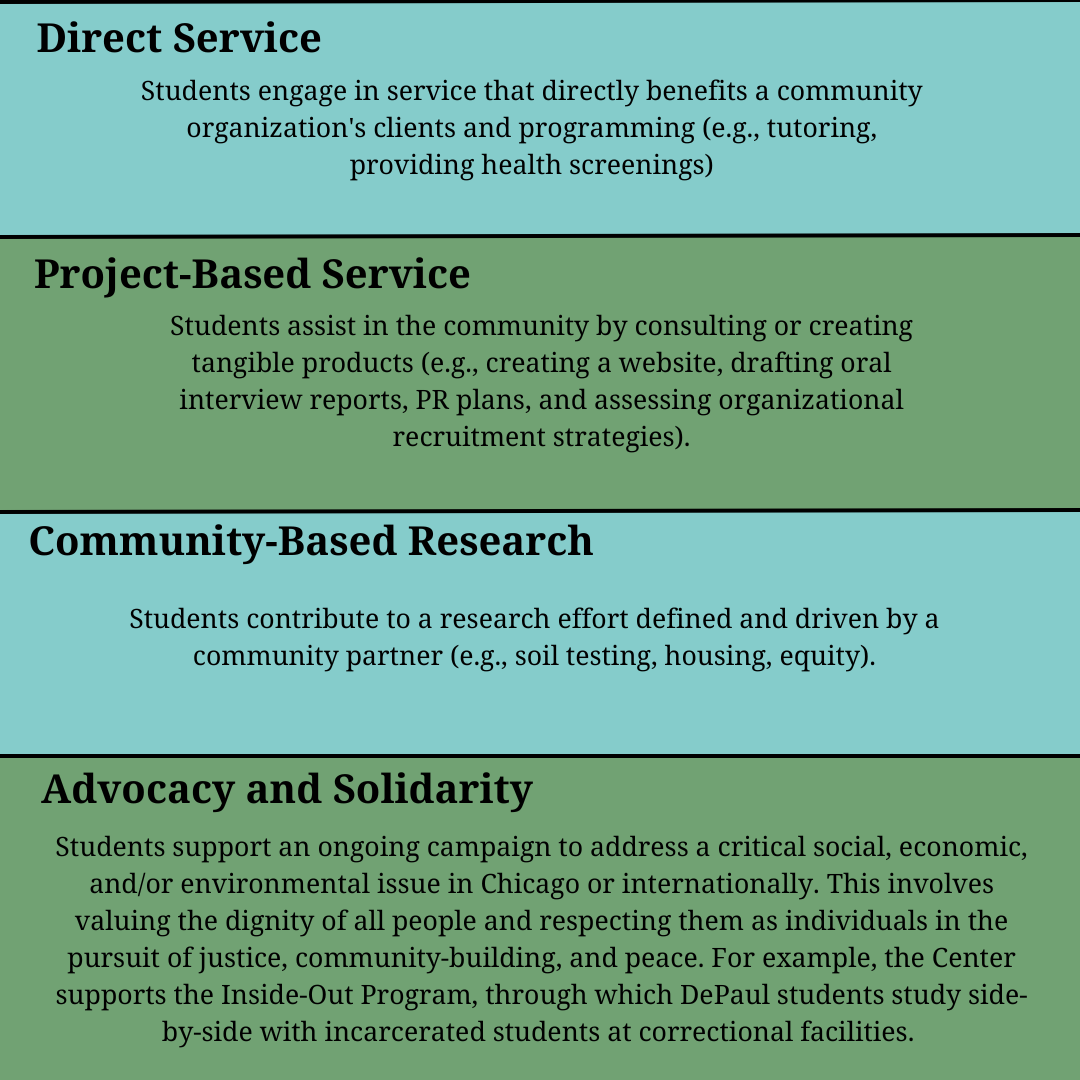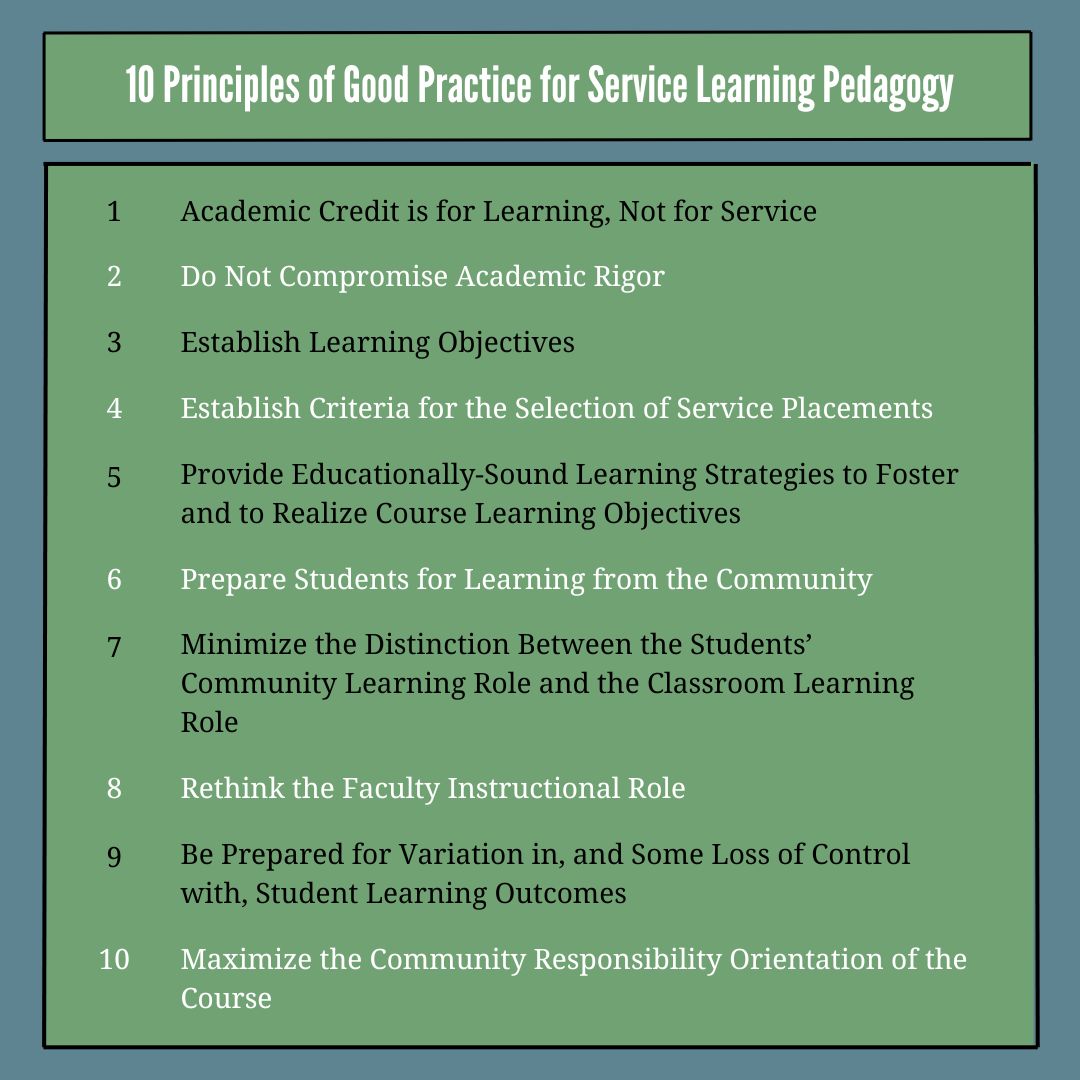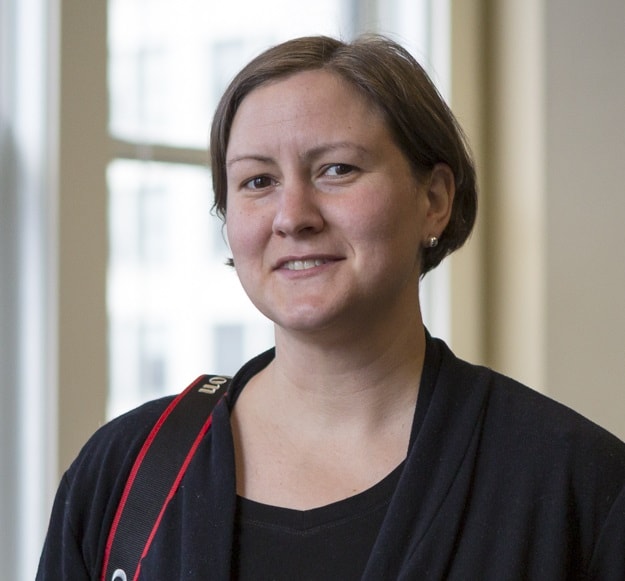Community-based Service Learning intentionally integrates meaningful community engagement with academic learning and purposeful civic learning.
DePaul Academic Service Learning Models
At DePaul, we support a variety of approaches to integrating service learning pedagogy into courses:

10 Principles of Good Practice for Service Learning Pedagogy
 Developed by Jeffrey Howard, former Associate Director for Service Learning at DePaul University
Developed by Jeffrey Howard, former Associate Director for Service Learning at DePaul University
"The Steans Center was very helpful in facilitating my History course's partnership with the San Miguel School in the Back of the Yards neighborhood. Here, DePaul students closely worked with the San Miguel students, some of whom were recent arrivals to the US, some of whom English was a second language. Due to the Steans Center's continuing commitment, San Miguel has accessed a small portion of the privilege those in more fortunate schools take for granted."
Dr. Aaron Lefkovitz
Professor of History
Build Relationships with Communities
Collaboration with communities lies at the heart of effective service learning practice. Building authentic relationships with community residents, organizations, and groups can raise such questions as
- Who or what is “the community” and “the university?”
- What is “service” and who is being “served”?
- Who has the power to create legitimate knowledge and solutions to address pressing issues in communities? How can an ABCD approach help to address this question?
- How can faculty and community partners manage the work of mentoring/supervising students as co-educators?
 “As a result of this partnership, our community partner, Erie House, benefitted from increased public awareness and news coverage. For example, one student had several articles about DACA recipients and Rohingya refugees published in a local magazine.”
“As a result of this partnership, our community partner, Erie House, benefitted from increased public awareness and news coverage. For example, one student had several articles about DACA recipients and Rohingya refugees published in a local magazine.”
- Professor Robin Hoecker, Journalism
Reflection
There are as many different types of reflection as there are courses, community sites, student learning styles, and faculty teaching approaches. Successful reflection assignments are intentionally designed with carefully aligned academic learning objectives and are integrated throughout the course, both in and outside the course.
The room helped bridge the gap between those at the school with severe autism, and those at the Theatre School who had never worked with people who had autism.
Ben Raanan, Service Learning student, Theatre School
View the list of reflection activities from K. Rice, "Reflection and Student Learning."
Examples of reflection assignments/activities include:
- Ethical Case Studies
- Self Portraits
- Class Presentations
- Personal Narratives
- Site Reports with reflective commentary
- Experiential Research Papers, researching a social issue encountered at a project or service site
Students can share their knowledge at the annual Service Speaks conference through PowerPoint, Pecha Kucha, performance, Spoken Word, etc.,
Professional Development
The CbSL Certificate Program allows DePaul faculty to:
- Identify appropriate evidence-based best practices for teaching CbSL and project-based learning
- Reflect on and articulate your assumptions and beliefs about teaching and learning in the classroom and community
- Apply pedagogical strategies and methods discussed in workshops to your teaching
- Create a course or other teaching strategy that strengthens student learning and honors community partnerships
- Develop a network of colleagues to discuss and develop pedagogical and career strategies
Through the
Faculty Community Immersion Institute participants will:
- Deepen their understanding of cultivating and sustaining community partnerships
- Deepen their understanding of Community-based Service Learning and Asset-Based Community Development
- Deepen their understanding of community history, current social justice issues, and assets
- Draft, revise, or improve a CbSL course, internship, or project
One-on-One Consultation
Meet with a member of the Steans Center Staff to consult directly about a possible course, partnership, or project. Contact Helen Damon-Moore, Associate Director, hdamonmo@depaul.edu.